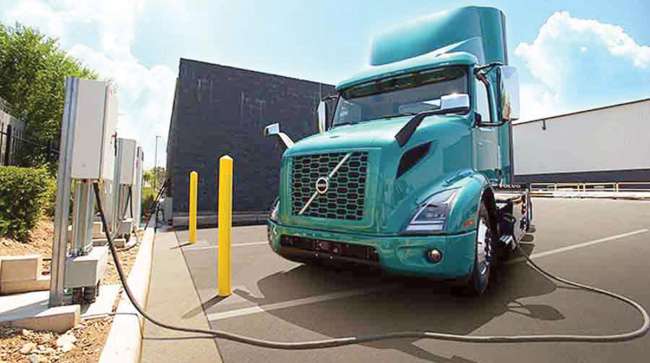A Volvo electric truck at a charging station. (Volvo Trucks)
Oregon will delay enforcing a rule that requires truck manufacturers to gradually increase electric truck sales in light of industry difficulties and Trump administration tariffs and threatened funding cuts, the state’s top environmental official said May 15.
State lawmakers and Gov. Tina Kotek also have applied pressure for the state to offer some relief.
Environmental groups said the two-year delay is largely due to the reluctance of truck engine manufacturers to invest in emission reduction technologies and will set back clean air and climate progress in the state.
The pause of the Advanced Clean Trucks Rule, which went into effect in January, begins immediately. The rule requires manufacturers to sell a growing percentage of electric medium- and heavy-duty trucks, buses and vans, including battery-electric and hybrid electric plug-ins.
It is a good morning. DEQ has chosen to take the common-sense step of giving certainty to countless Oregon businesses and workers whose livelihoods have been staring down the barrel of a loaded gun for months now. They can breathe a sigh of relief today. #orpol #orleg pic.twitter.com/i0LBnxksM8
— Shelly Boshart Davis (@BoshartDavisAg) May 15, 2025
Department of Environmental Quality Director Leah Feldon said she made the decision, according to a memo she sent to the agency’s air quality regulators.
During the next two years, Oregon will not fine manufacturers who fail to meet the rule’s sales requirements, the memo said. Manufacturers will still need to submit sales and compliance reports to the state and report on their efforts to adapt clean technologies.
The enforcement suspension coincides with Republican efforts in the state Legislature to delay the truck rule by two years. That bill is now dead.
It also comes on the heels of a letter that Kotek sent to Feldon in March urging DEQ to ease the rule for manufacturers of the largest trucks. Kotek’s letter came after Portland-based Daimler Truck North America temporarily halted big truck sales in Oregon because, according to the company, it couldn’t sell enough electric trucks to satisfy the new rule.
And it follows the DEQ delaying by a year a separate rule meant to lower tailpipe pollution from diesel trucks, buses and vans. That rule requires new diesel trucks, buses and vans sold in Oregon to have engines that produce lower amounts of nitrogen oxide and fine particulate matter — pollutants tied to health risks including lung and heart problems, asthma and premature deaths.
Read More
► Emission Rules in Flux; Truck Makers Stay the Course
► Trucking Industry Awaits Trump Regulatory Shift
► Uncertainty Dominates Pre-Buy Discussions Ahead of 2027
Feldon said manufacturers have told regulators they’re having trouble reaching the state’s electric truck and bus sales targets because electric trucks are expensive to make and to buy and the state and country lack truck charging stations.
Feldon put much of the blame for the delay on recent threats of federal cutbacks and Trump tariffs.
“The current federal administration has created significant uncertainty around [zero-emission vehicle] incentives, electric vehicle charging investments, manufacturing and tariffs, each of which threaten a smooth transition to medium- and heavy-duty ZEVs,” Feldon wrote in her memo.
The pause is also meant to help Oregon businesses and fleet owners who need to buy new conventional and electric trucks, Feldon wrote, as some manufacturers have limited new diesel truck sales as a means to ensure compliance with the truck rule, thus reducing new truck availability in Oregon.
State Rep. Shelly Boshart Davis (R-Albany), who spearheaded the bill to delay the truck rule by two years, called the delay “common sense.”
TT’s Seth Clevenger, Michael Freeze and Keiron Greenhalgh break down what ACT Expo revealed about trucking’s road to sustainability. Tune in above or by going to RoadSigns.ttnews.com.
“The lack of sufficient charging infrastructure, the limited range and payload of current electric trucks, and the high costs have always made the ACT rules unrealistic,” she said in a statement.
Kotek said the rule remains on the books and will be enforced at a later date.
“The requirements are an important part of reaching our greenhouse gas emissions reduction targets and ensuring healthier air quality for all Oregonians,” Kotek said in a statement.
Cars and trucks, including big rigs, account for 35% of Oregon’s total greenhouse gas emissions, according to the DEQ, and are major contributors to nitrogen oxide and diesel particulate matter pollution.
Environmental groups decried the delay and said it would cost Oregonians tens of millions in health care costs linked to respiratory diseases.
“Delaying Oregon’s clean truck rules is not just a policy decision, it’s a public health failure,” said Mary Peveto, executive director of Neighbors for Clean Air, a Portland-based nonprofit that has for years pushed for stricter diesel regulations. “Diesel pollution is a proven threat to heart and lung health, particularly for children, seniors and communities living near highways and freight corridors.”
Peveto said the DEQ bowed to pressure from oil and gas interests and truck manufacturers “as part of a nationally orchestrated multistate campaign to derail the transition to clean vehicles.”
The rule delay comes as the Republican-controlled Congress is working to revoke California’s Clean Air Act waivers — the same authority Oregon and a half-dozen other states used to adopt the clean truck rule. If that effort goes through, it would make it challenging for Oregon and other states to uphold their clean truck rules.







